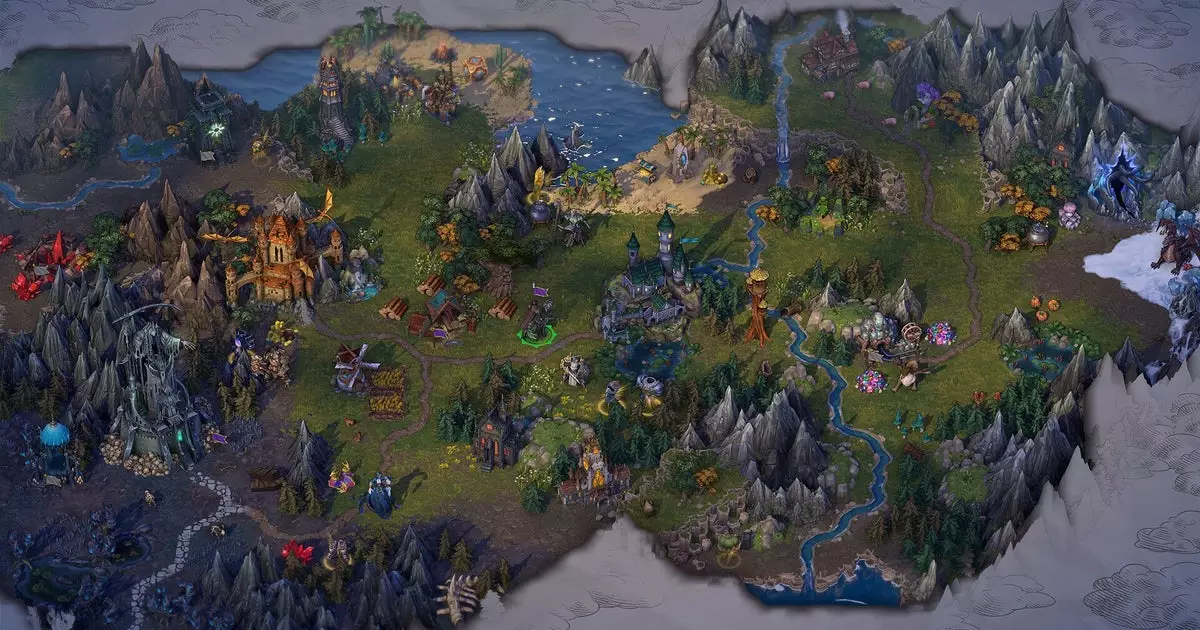In an astonishing turn of events within the gaming industry, Ubisoft has chosen to entrust the publishing responsibilities of its highly anticipated title, *Heroes of Might and Magic: Olden Era*, to a relatively smaller but strategically focused publisher, Hooded Horse. This decision is not only unorthodox but also signifies a deeper, perhaps more calculated shift in how major studios approach legacy franchises in a rapidly evolving market. Rather than a straightforward move, it embodies a layered strategy concerning branding, resource allocation, and market positioning.
While Ubisoft remains the owner of the intellectual property, the decision to have Hooded Horse handle the day-to-day publishing operations suggests an acknowledgment of the challenges inherent in marketing a revamp of a beloved, yet niche series. The emphasis appears to be on leveraging Hooded Horse’s expertise in the strategy genre, tapping into their established community of dedicated fans, and amplifying outreach efforts that a sprawling behemoth like Ubisoft might struggle to sustain for every individual project.
This relationship’s particularity raises critical questions about the industry’s shifting dynamics. Is Ubisoft retreating from direct publisher roles to focus on core development? Or are they deliberately outsourcing to optimize costs while still maintaining a stake in the franchise? The truth likely involves a mix of both—an acknowledgment that a smaller, more nimble partner could deliver targeted marketing and engagement strategies that resonate authentically with the hardcore strategy community, perhaps increasing the game’s chances of success in a competitive landscape.
The Strategic Rationale: Why Outsource Now?
The decision to pivot publisher responsibilities can be scrutinized from multiple angles. On the surface, it seems counterintuitive for a global giant like Ubisoft to step back from actively publishing a franchise with such nostalgic appeal. However, considering recent corporate upheavals and internal restructuring, the move begins to make a certain kind of sense.
Earlier this year, Ubisoft underwent a split into separate entities, pulling certain franchises into subsidiaries aligned with major Asian investors like Tencent, while remaining responsible for others, including Rabbids and certain smaller IPs. This fragmentation likely strained internal resources, prompting the company to rethink how it manages its portfolio. Cost-cutting, increasingly cautious strategic investments, and delays—including those announced for *Heroes of Might and Magic: Olden Era*—are symptomatic of an industry grappling with economic pressures and shifting consumer preferences.
Engaging Hooded Horse as a publisher is thus an economic decision as much as a strategic one. It promises to extend the game’s reach through specialized marketing and localized outreach that larger, bureaucratic organizations—I.e., Ubisoft—might not execute as efficiently. For Hooded Horse, this partnership is an opportunity to bolster their reputation by handling a storied franchise, potentially attracting new fans and strengthening their foothold in the strategy game genre.
Fragile Nostalgia and Its Commercial Implications
Reviving a series rooted in the mid-1990s, *Heroes of Might and Magic: Olden Era* aims to re-capture the essence of the franchise’s roots. Yet, historical nostalgia is a tricky currency; what appeals to long-time fans might alienate newer audiences unfamiliar with its lore. Ubisoft’s decision to partner with Hooded Horse signals an awareness that a targeted, community-driven approach could play a pivotal role in positioning the game in a cluttered digital marketplace.
While the developers are excited, and the game aims to bring strategic combat back to a core prequel experience, the industry’s broader trend indicates caution. Many legacy titles face diminished visibility due to shifting algorithms, consumer fatigue, and the rising dominance of live-service models. In this light, the move to outsource is a calculated gambit—hopeful that the publisher’s niche expertise and aggressive regional marketing will ensure the game’s success.
Although the long-term viability of such revitalizations remains uncertain, what cannot be disputed is that Ubisoft’s willingness to experiment signals a broader willingness to adapt. It reflects an industry increasingly aware that the path to profitability involves not just big-name branding but also strategic collaborations that harness specialized expertise and community trust. The jury is still out on whether this particular gamble will pay off, but it undeniably signals a more nuanced approach to franchise management—one rooted in pragmatic adaptation rather than blind traditionalism.

